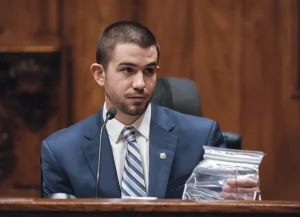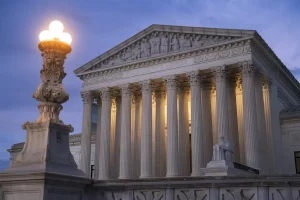The United States Supreme Court recently addressed the question of whether the Confrontation Clause of the  Sixth Amendment is violated when a substitute analyst provides expert witness testimony about the results of forensic testing performed by a non-testifying analyst.
Sixth Amendment is violated when a substitute analyst provides expert witness testimony about the results of forensic testing performed by a non-testifying analyst.
The Court held that when an expert, in this instance a substitute analyst, presents the out-of-court statements of another analyst as the basis for their own expert opinion, the statements are being offered for their truth.
This implicates the Confrontation Clause because the defendant is not able to cross-examine the original analyst about the testing procedures and results.
While the full implications of Smith v. Arizona will unfold over time, it seems likely that the decision will have a lasting impact on the criminal justice system – Bill Powers, Criminal Defense Lawyer
The Evolution of Forensic Evidence in Criminal Trials
The Confrontation Clause and Forensic Evidence: The Smith v Arizona Court emphasized that the Confrontation Clause applies to forensic reports, meaning a defendant has the right to cross-examine the analyst who conducted the testing.
The Court acknowledged the importance of cross-examination to test the reliability of forensic evidence, indicating lab tests are not immune to errors or manipulation.
Confrontation Clause Challenges in Expert Testimony
The Issue of “Basis Evidence”: The Court rejected the government’s argument that an expert’s recitation of an absent analyst’s findings is not subject to the Confrontation Clause simply because it is presented as the “basis” for the expert’s own opinion.
Criminal Law FAQs in North Carolina
The Court reasoned that the truth of the underlying statements is essential to the expert’s opinion, and the finder of fact cannot fully or fairly evaluate the expert’s opinion without also assessing the truth of those statements.
Allowing substitute analysts to present such statements without the opportunity for cross-examination would effectively sidestep the protections of the Confrontation Clause as it applies to forensic evidence.
Hearsay Evidence and Expert Witness Testimony
The Role of Expert Witnesses: The Court clarified that its decision does not preclude forensic Rule 702 experts from testifying in criminal trials. For instance, experts can still testify about general laboratory procedures, industry standards, or hypothetical scenarios. What the Court prohibited was the use of a substitute expert as a mere “mouthpiece” for the absent analyst, relaying the specifics of the testing and results without the defendant having an opportunity to cross-examine the analyst who actually did the work.
That’s important and could have wide-ranging implications in North Carolina for drug charges, DNA evidence in sex crimes, and DUI charges.
Limits on Substitute Expert Witnesses in Criminal Cases
Remand on “Testimonial” Issue: The Court remanded the case for a determination of whether the lab  analyst’s report and notes were “testimonial.” This issue centers on whether the primary purpose of the report and notes was to create an out-of-court substitute for trial testimony. The Court declined to rule on this issue itself, leaving it for further consideration.
analyst’s report and notes were “testimonial.” This issue centers on whether the primary purpose of the report and notes was to create an out-of-court substitute for trial testimony. The Court declined to rule on this issue itself, leaving it for further consideration.
Impact on Forensic Lab Reports and Criminal Prosecutions
Concurrences: Justice Thomas concurred in part, agreeing with the majority’s holding but disagreeing with the emphasis on the “primary purpose” test for determining whether a statement is testimonial.
Justice Thomas opined the focus should be on whether the statement is sufficiently formal and solemn to resemble the type of testimonial evidence the Confrontation Clause was designed to protect against.
Justice Gorsuch also concurred in part, agreeing that presenting another’s statements as the basis for an opinion amounts to offering them for their truth, but disagreeing with the Court’s discussion of the “testimonial” standard.
Justice Gorsuch expressed concern that the Court’s reliance on the “primary purpose” test lacks sufficient grounding in the text and history of the Confrontation Clause and could create confusion in its application.
Justice Alito, joined by Chief Justice Roberts, concurred only in the judgment.
Justice Alito criticized the majority for undermining modern evidence rules that allow experts to disclose the basis for their opinions. He argued that the Court’s concern about juries being unable to follow limiting instructions regarding the purpose of basis evidence is at odds with established case law and trial practice.
Justice Alito believes juries can follow limiting instructions and fears the decision will revive the impractical and confusing use of hypothetical questions.
What should you do if you’re arrested?
Justice Alito maintained that the expert’s testimony in this specific case was inadmissible hearsay, and thus violated the Confrontation Clause, because the expert went beyond merely disclosing the basis for his opinion and asserted the truth of the absent analyst’s findings.
Balancing Scientific Evidence and Constitutional Rights
Smith v. Arizona therefore generally holds that when an expert witness presents an absent analyst’s statements to support their opinion, then they are likely being admitted for their truth, which could violate the Confrontation Clause.
An expert can testify about general lab practices, forensic guidelines, or answer hypothetical questions based on out-of-court statements. However, they cannot relay an absent analyst’s specific findings to prove their truth without violating the defendant’s right to confront that analyst.
The Confrontation Clause is triggered when out-of-court statements are offered to prove the truth of what they assert. In Smith, the Court found that the expert’s reliance on the absent analyst’s statements only made sense if those statements were being offered to prove their truth.
The Court found that evidentiary rules cannot supersede the constitutional right of confrontation. While Arizona’s rule allowed for “basis” testimony, the Court’s analysis focused on whether the statements were offered for their truth, regardless of the evidentiary rule’s label.
Smith argued that Longoni was presenting analyst Rast’s statements as true, violating the defendant’s right to confront the testing analyst, their procedures, protocols, and possible sources of errors during testing. The government (the State of Arizona) contended that the substitute analyst Longoni offered an independent opinion, using Rast’s records only as a basis, not to prove their truth.
To be clear, Longoni went beyond stating an independent opinion by repeatedly affirming the truth of Rast’s procedures and findings. In effect, he acted as her “mouthpiece,” stating the testing analyst followed protocols and obtained specific results, which directly implicated the truth of the absent testimony.
Crawford v. Washington, Melendez-Diaz v. Massachusetts, and Bullcoming v. New Mexico establish that testimonial out-of-court statements from unavailable witnesses are inadmissible unless the defendant had a prior opportunity to cross-examine. These cases applied the Confrontation Clause to forensic reports.
Experts can still testify about general lab practices, forensic methods, or answer hypothetical questions based on potential out-of-court scenarios. They can provide expertise without directly conveying the truth of an absent analyst’s specific findings.
DWI Charges in Charlotte – FAQs
The Court remanded the issue of whether the specific records Longoni used (notes or notes and report) were “testimonial” in nature.
This determination hinges on whether their primary purpose related to a future criminal proceeding, a question the Arizona court must now address.
Confrontation Clause: The Sixth Amendment’s guarantee that in criminal prosecutions, the accused has the right “to be confronted with the witnesses against him.”
Testimonial Statements: Statements made out of court that are primarily intended to be used as evidence in a future trial.
Hearsay: An out-of-court statement offered in court to prove the truth of the matter asserted. Generally inadmissible, but there are important exceptions. Indeed, under the NC Rules of Evidence, some matters are specifically excluded as “hearsay” and therefore not subject to an exception to the Hearsay Rule.
Forensic Evidence: Scientific evidence, such as DNA analysis, ballistics, or drug testing, used in legal proceedings.
Expert Witness: A person who possesses specialized knowledge, skill, experience, training, or education in a particular field and is allowed to offer their opinions in court to assist the finder of fact.
Basis Testimony: An expert witness’s explanation of the underlying facts, data, or information they relied upon in forming their opinion.
Free Download: The NC DWI Quick Reference Guide
“Not for the Truth” Rationale: The argument that an out-of-court statement is not hearsay if it is presented for a purpose other than proving the truth of the statement itself, such as to explain the basis of an expert’s opinion.
Limiting Instruction: An instruction given by the judge to the jury that limits the purposes for which they may consider specific evidence.
Hypothetical Question: A question posed to an expert witness that asks them to assume certain facts as true and then render an opinion based on those assumed facts.
The Future of Expert Testimony in Criminal Trials
The Supreme Court’s decision in Smith v. Arizona marks a potentially significant turning point in the presentation of expert testimony in criminal trials in North Carolina oncerning forensic evidence. This ruling reinforces the importance of the Confrontation Clause and sets a new standard for how courts must balance the need for scientific expertise with defendants’ constitutional rights. It also appears to run directly contrary to North Carolina’s trend of allowing testimony by substitute analysts.
Moving forward, we can expect several key developments:
- Increased scrutiny of expert testimony: Courts will likely apply stricter standards when evaluating the admissibility of expert testimony based on analyses performed by non-testifying witnesses.
- Changes in forensic lab practices: Laboratories may need to adjust their procedures to ensure that analysts who perform tests are available for testimony, potentially impacting workflow and staffing decisions.
- New strategies for prosecutors and defense attorneys: Both sides will need to adapt their approaches to presenting and challenging forensic evidence in light of this ruling.
- Potential legislative responses: State legislatures may consider new laws or regulations to address the practical challenges posed by this decision while maintaining compliance with constitutional requirements.
- Continued legal challenges: As lower courts interpret and apply the Smith v. Arizona standard, we can expect further refinement of these principles through additional legal challenges and appeals.
- Enhanced focus on cross-examination skills: Defense attorneys may place greater emphasis on developing effective strategies for cross-examining forensic experts, given the increased importance of this opportunity.
- Potential impact on plea bargaining: The heightened scrutiny of forensic evidence may influence plea negotiations in cases heavily reliant on such evidence, especially if test results and other forensic materials are excluded from evidence.
Smith v Arizona underscores the ongoing challenge of balancing scientific advancements with foundational constitutional protections, a tension that will likely continue to shape the evolution of criminal law in the years to come.
As the legal community grapples with these changes, it will be important for all stakeholders – from forensic scientists to legal practitioners to policymakers – to work collaboratively to ensure that justice is served while upholding the fundamental rights of the accused. The legacy of Smith v. Arizona may well be a criminal justice system that more rigorously examines scientific evidence, ultimately leading to fairer trials and more just outcomes. Call the criminal defense and DUI lawyers at Powers Law Firm if you have questions about criminal charges in Mecklenburg, Union County NC, Iredell, Rowan, Gaston, and Lincoln County, North Carolina.
 Carolina Criminal Defense & DUI Lawyer Updates
Carolina Criminal Defense & DUI Lawyer Updates